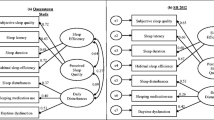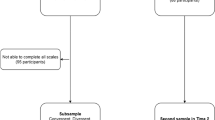Abstract
To assess the reliability and validity concerning the formal European Portuguese version of the Pittsburgh Sleep Quality Index [PSQI (EP)], its accuracy, and optimal cut-off point. N = 564 volunteers (18–80 years old) recruited in several settings (e.g., university campuses; work place; home; sleep consultations), agreed to complete the PSQI (EP). Subgroups completed additional measures: Insomnia Severity Index (ISI), STOP-Bang, Glasgow Sleep Effort Scale, or responded to a supplementary question about perceived sleep problems. As to internal consistency, Cronbach’s α = 0.75. Principal component analysis revealed a unidimensional structure. Six PSQI (EP) components and total scores were able to discriminate individuals who did versus did not describe having any sleep problem; all PSQI (EP) scores were significantly higher (denoting poorer quality) in participants suffering from a sleep disorder. Most Cohen’s d values showed large magnitude associations. PSQI (EP) and ISI scores were highly correlated, but no significant correlations were found considering STOP-Bang. ROC analysis confirmed an optimal cut-off point > 5 of the PSQI (EP) to detect self-reported poor/good sleepers in non-clinical settings. To discriminate non-clinical from clinical sleep patients, the optimal cutoff was > 7, and AUC = 0.94. The European Portuguese version of the PSQI performs as a reliable, valid, and accurate measure of overall sleep quality in Portuguese participants. Furthermore, results suggest that PSQI (EP) can discriminate poor sleepers in non-clinical settings, in addition to demonstrating high clinical accuracy in signaling potential sleep-disorder cases. In conclusion, the PSQI (EP) is a suitable tool to assess general sleep quality in Portuguese participants, both for clinical or non-clinical applications.


Similar content being viewed by others
Notes
There are two standard forms of Portuguese language: the Portuguese for Portugal also termed European Portuguese (which is the reference for Portugal, the Portuguese-speaking African countries, East Timor and Macau), and the Brazilian Portuguese.
References
Buysse D, Reynolds C III, Monk T, Berman S, Kupfer D. The Pittsburgh sleep quality index: a new instrument for psychiatric practice and research. Psychiatry Res. 1989;28:193–213. https://doi.org/10.1016/0165-1781(89)90047-4.
Chiu H, Chang L, Hsieh Y, Tsai P. A meta-analysis of diagnostic accuracy of three screening tools for insomnia. J Psychosom Res. 2016;87:85–92. https://doi.org/10.1016/j.jpsychores.2016.06.010.
Mollayeva T, Thurairajah P, Burton K, Mollayeva S, Shapiro CM, Colantonio A. The Pittsburgh sleep quality index as a screening tool for sleep dysfunction in clinical and non-clinical samples: a systematic review and meta-analysis. Sleep Med Rev. 2016;25:52–73. https://doi.org/10.1016/j.smrv.2015.01.009.
Marques D, Gomes A, Meia-Via A, Salgueiro A, Teixeira C, Ribeiro J, Dischler R. Reliability and preliminary validation of the Pittsburgh Sleep Quality Index in a sample of higher education students (Abstract). Sleep Med. 2013;14:e140. https://doi.org/10.1016/j.sleep.2013.11.316.
Fontes F, Gonçalves M, Maia S, Pereira S, Severo M, Lunet N. Reliability and validity of the Pittsburgh Sleep Quality Index in breast cancer patients. Support Care Cancer. 2017;25:3059–66. https://doi.org/10.1007/s00520-017-3713-9.
João K, Becker N, Jesus S, Martins R. Validation of the Portuguese version of the Pittsburgh Sleep Quality Index (PSQI-PT). Psychiatry Res. 2017;247:225–9. https://doi.org/10.1016/j.psychres.2016.11.042.
Paiva T, Penzel T. Centro de medicina do sono: manual prático. Lisboa: Lidel; 2011.
Mapi Research Institute. Questionário de Pittsburgh sobre a Qualidade do Sono. PQSI—Portugal/Portuguese—Version of 18 Sep 08 [ID4842/PSQI_AU1.0_por-PT.doc]. Boston: Mapi Research Trust; 2008.
American Academy of Sleep Medicine. International classification of sleep disorders (Darien, IL American Academy of Sleep Medicine). 3rd ed. Westchester: American Academy of Sleep Medicine; 2014.
International Standard Classification of Occupations: ISCO-08/Inetrnational Labour Office. Geneva: ILO; 2012.
Morin C. Insomnia: psychological assessment and management. New York: The Guilford Press; 1993.
Clemente V. Insomnia Severity Index—ISI, European Portuguese Version. Coimbra University Hospital Centre, Sleep Medicine Centre, Portugal; 2007/2013.
Clemente V, Allen Gomes A, Mendes MM, Marques DR, Russo B, Serra J, Moutinho dos Santos J, Moita J. The European Portuguese version of the insomnia severity index (ISI): reliability, validity and diagnostic accuracy. Sleep Med. 2017;40:e67. https://doi.org/10.1016/j.sleep.2017.11.191.
Broomfield NM, Espie CA. Towards a valid, reliable measure of sleep effort. J Sleep Res. 2005;14:401–7. https://doi.org/10.1111/j.1365-2869.2005.00481.x.
Meia-Via MS, Marques DR, Espie CA, da Silva CF, Allen Gomes A. Psychometric properties of Glasgow Sleep Effort Scale in Portuguese language. Psychol Assess 2016;2:e12–8. https://doi.org/10.1037/pas0000178.
Chung F, Yegneswaran B, Liao P, Chung SA, Vairavanathan S, Islam S, Khajehdehi A, Shapiro CM. STOP questionnaire: a tool to screen patients for obstructive sleep apnea. Anesthesiology. 2008;108:812–21. https://doi.org/10.1097/ALN.0b013e31816d83e4.
Silva A, Pereira H, Xará D, Mendonça J, Cunha I, Santos A, Abelha F. Síndrome da apneia obstrutiva do sono e complicações respiratórias pós-operatórias. Revista da Sociedade Portuguesa de Anestesiologia. 2013;22:66–73.
Reis R, Teixeira F, Martins V, Sousa L, Batata L, Santos C, Moutinho J. Validation of a Portuguese version of the STOP-Bang questionnaire as a screening tool for obstructive sleep apnea: analysis in a sleep clinic. Rev Port Pneumol (Engl Ed). 2015;21:61–8. https://doi.org/10.1016/j.rppnen.2014.04.009.
Morin CM, Belleville G, Bélanger L, Ivers H. The Insomnia Severity Index: psychometric indicators to detect insomnia cases and evaluate treatment response. Sleep. 2011;34:601–8.
Field A. Discovering statistics using IBM SPSS statistics. 4th ed. London: Sage; 2013.
Pintea S, Moldova R. The receiver-operating characteristic (ROC) analysis: fundamentals and applications in clinical psychology. J Cogn Behav Psychother. 2009;9:49–66.
Gelaye B, Lohsoonthorn V, Lertmeharit S, Pensuksan WC, Sanchez SE, Lemma S, Berhane Y, Zhu X, Vélez JC, Barbosa C, Anderade A, Tadesse MG, Williams MA. Construct validity and factor structure of the Pittsburgh Sleep Quality Index and Epworth Sleepiness Scale in a multi-national study of African, South East Asian and South American college students. PLoS One. 2014;9:e116383. https://doi.org/10.1371/journal.pone.0116383.
Zhong Q-Y, Gelaye B, Sánchez SE, Williams MA. Psychometric properties of the Pittsburgh Sleep Quality Index (PSQI) in a cohort of Peruvian pregnant women. J Clin Sleep Med. 2015;11:869–77. https://doi.org/10.5664/jcsm.4936.
Magee CA, Caputi P, Iverson DC, Huang XF. An investigation of the dimensionality of the Pittsburgh Sleep Quality Index in Australian adults. Sleep Biol Rhythms. 2008;6:222–7. https://doi.org/10.1111/j.1479-8425.2008.00371.x.
Manzar MD, Moiz JA, Zannat W, Spence D, Pandi-Perumal S, BaHammam A, Hussain M. Validity of the Pittsburgh Sleep Quality Index in Indian University Students. Oman Med J. 2015;30:193–202. https://doi.org/10.5001/omj.2015.41.
Acknowledgements
Thanks are due to the Department of Education and Psychology of the University of Aveiro, which supported most printed materials for data collection. We also acknowledge the support from the R&D Unit IBILI (FM-UC), FCT Portugal (Portuguese Science and Technology Foundation). Manuscript preparation is presently supported by the corresponding author’s current institutional affiliations: Faculty of Psychology and Educational Sciences, University of Coimbra (FPCE-UC), and FCT R&D Unit CINEICC: Center for Research in Neuropsychology and Cognitive Behavioral Intervention, at the FPCE-UC. We are grateful to A. R. Salgueiro, C. T. Carlos, J. M. Ribeiro, and R. G. Dischler for their contribution to participant recruitment and database insertion of questionnaires.
Author information
Authors and Affiliations
Corresponding author
Ethics declarations
Conflict of interest
The authors have no conflict of interest to declare.
Ethical standards
All procedures performed in studies involving human participants were in accordance with the ethical standards of the institutional and/or national research committee and with the 1964 Helsinki declaration and its later amendments or comparable ethical standards. This article does not contain any studies with animals performed by any of the authors.
Informed consent
Informed consent was obtained from all individual participants included in the study.
Rights and permissions
About this article
Cite this article
Gomes, A.A., Marques, D.R., Meiavia, A.M. et al. Psychometric properties and accuracy of the European Portuguese version of the Pittsburgh Sleep Quality Index in clinical and non-clinical samples. Sleep Biol. Rhythms 16, 413–422 (2018). https://doi.org/10.1007/s41105-018-0171-9
Received:
Accepted:
Published:
Issue Date:
DOI: https://doi.org/10.1007/s41105-018-0171-9




